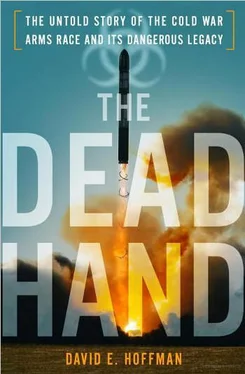Gorbachev later claimed there were two reasons for the delay: he lacked information and didn’t want to create panic. The Kremlin eventually instructed the news media to distribute a statement so terse as to relay none of the catastrophic nature of the event. The announcement was issued at 9 P.M. on April 28:
An accident has occurred at the Chernobyl Nuclear Power Plant, damaging one of the reactors. Measures are being taken to eliminate the consequences of the accident. The injured are receiving aid. A government commission has been set up. 29
On the next day, April 29, Gorbachev called another Politburo meeting. According to Volkogonov, Gorbachev now realized “that he had anything but a routine problem on his hands,” given the global alarm about the accident. He began consulting with physicists and security officials. Gorbachev opened the Politburo meeting with a terse remark, “Perhaps we aren’t reacting as sharply as the states around us?” Gorbachev proposed they create an operational group to manage the crisis. He then asked, “How are we to deal with the population and international public opinion?” He paused and added a somewhat contradictory remark: “The more honestly we conduct ourselves, the better. To ensure that a shadow of suspicion should not fall on our equipment, we must say that the power station was undergoing a planned repair…”
After more discussion, the Politburo decided to issue another public statement, which Volkogonov described as “terms that might have been used to announce an ordinary fire at a warehouse.” 30The announcement said the accident had destroyed part of the reactor building, the reactor itself, and caused a degree of leakage of radioactive substances. Two people had died, the statement said, and “at the present time, the radiation situation at the power station and the vicinity has been stabilized.” One section was added for socialist countries saying that Soviet experts had noted radiation spreading in the western, northern and southern directions from Chernobyl. “Levels of contamination are somewhat higher than permitted standards, however not to the extent that calls for special measures to protect the population.” 31
In the early weeks, firefighters and “liquidators,” people called from all over the country to help mitigate the disaster, fought bravely and worked with amazing courage and dedication in the face of danger. Firefighters recalled standing on a roof so hot their boots melted; helicopter pilots braved the smoldering ruins to dump 5,020 metric tons of sand and other material in an effort to suffocate what appeared to be a red glow, the burning graphite reactor below. 32But while individuals performed acts of heroism, the bosses of the Soviet state obfuscated. One of the first actions of the plant director was to cut nonessential telephone lines around Chernobyl. 33An evacuation of Pripyat was begun only thirty-six hours after the explosion; the second stage of the evacuation, including a wider zone that eventually displaced 116,000 people, did not begin until May 5. The Communist Party in Ukraine insisted that May Day parades should carry on as usual in Kiev even though winds were blowing in that direction. On May 1 in Moscow, Nikolai Ryzhkov, the prime minister, signed an instruction to take Soviet news correspondents to areas adjacent to the Chernobyl power station with a goal of preparing reports in newspapers and television showing the “normal vital activity of these areas.” 34But the truth was dawning at the highest levels in Moscow. The same instruction from Ryzhkov admitted the Health Ministry “failed” to provide full information from the scene and insisted that the ministry “take urgent measures to bring order into this affair.”
Reagan wrote in his diary, “As usual the Russians won’t put out any facts but it is evident that a radioactive cloud is spreading beyond the Soviet border.” 35
Vladimir Gubarev, the science editor of Pravda , who had good contacts in the nuclear establishment, heard of the accident soon after it happened and called Yakovlev, Gorbachev’s close adviser and champion of new thinking. But Yakovlev told him to “forget about it, and stop meddling,” Gubarev recalled. Yakovlev wanted no journalists to witness the scene. But Gubarev was persistent, and kept calling Yakovlev every day. Yakovlev finally authorized a group of journalists to go to Chernobyl, including Gubarev, who had a physics degree but also wrote plays and books. He arrived May 4 and returned May 9. His private report to Yakovlev depicted chaos and confusion. One hour after the explosion, the spread of radiation was clear, he said, but no emergency measures had been prepared. “No one knew what to do.” Soldiers were sent into the danger zone without individual protective gear. They didn’t have any. Nor did helicopter pilots. “In a case like this, common sense is required, not false bravery,” he said. “The whole system of civil defense turned out to be entirely paralyzed. Even functioning dosimeters were not available.” Gubarev said, “the sluggishness of local authorities is striking. There were no clothes, shoes, or underwear for victims. They were waiting for instructions from Moscow.” In Kiev, the lack of information caused panic. People heard reports from abroad but didn’t get a single word of reassurance from the leaders of the republic. The silence created more panic in the following days when it became known that children and families of party bosses were fleeing. “A thousand people stood in line in the ticket office of the Ukraine Communist Party Central Committee,” Gubarev said. “Naturally, this was perfectly well known in the city.” When Gubarev returned to Moscow, he gave Yakovlev his written report. It was passed to Gorbachev. 36
Gorbachev finally spoke about the disaster on May 14, two and a half weeks after it happened, in a nationally televised address. He looked “like a man bereaved,” recalled Angus Roxburgh, the BBC correspondent. “His face showed that he knew he had lost credibility.” His speech dodged the reasons for the catastrophe, and advanced the line that people had been alerted “as soon as we received reliable initial information.” Gorbachev seemed to lose his cool entirely at some of the wild accusations that spread in the West while the Kremlin had bottled up information, such as early reports of mass casualties in the thousands. He also took umbrage at criticism of his sincerity as a reformer. The United States and Germany “launched an unrestrained anti-Soviet campaign,” he complained.
In the weeks after Chernobyl, Gorbachev began to shake off his early inertia. At the Politburo meeting July 3, his fury boiled over at the nuclear establishment.
For 30 years you’ve been telling us that everything was safe. And you expected us to take it as the word of God. This is the root of our problems. Ministries and research centers got out of control, which led to disaster. And, so far, I do not see any signs that you’ve learned your lesson from this… Everything was kept secret from the Central Committee. Its apparat didn’t dare to look into this area. Even decisions about where to build nuclear power stations weren’t made by the leadership. Or decisions about which reactor to employ. The system was plagued by servility, bootlicking, window-dressing…persecution of critics, boasting, favoritism, and clannish management.
Chernobyl happened and nobody was ready—neither civil defense, nor medical departments, not even the minimum necessary number of radiation counters. The fire brigades don’t know what to do! The next day, people were having weddings not far away from the place. Children were playing outside. The warning system is no good! There was a cloud after the explosion. Did anyone monitor its movement? 37
Читать дальше












